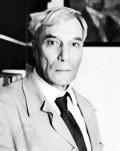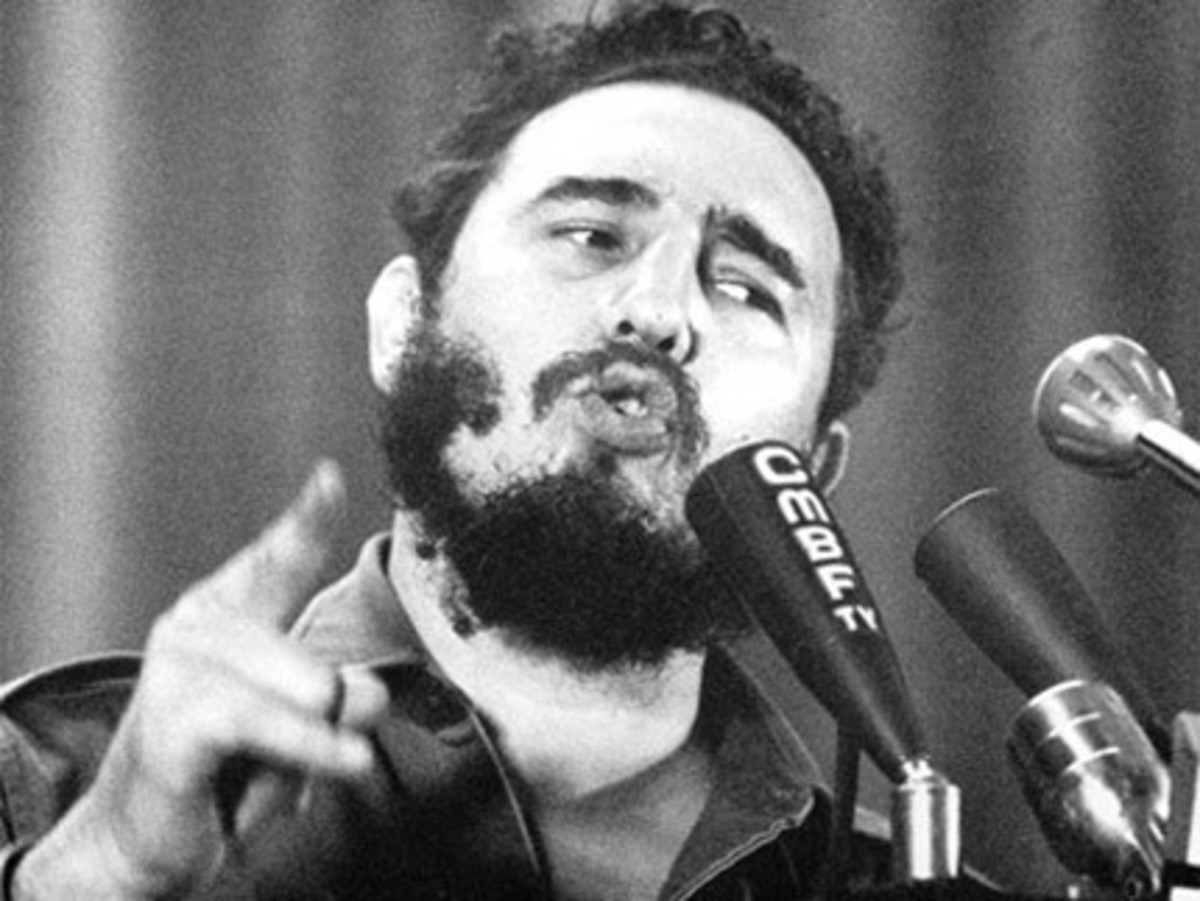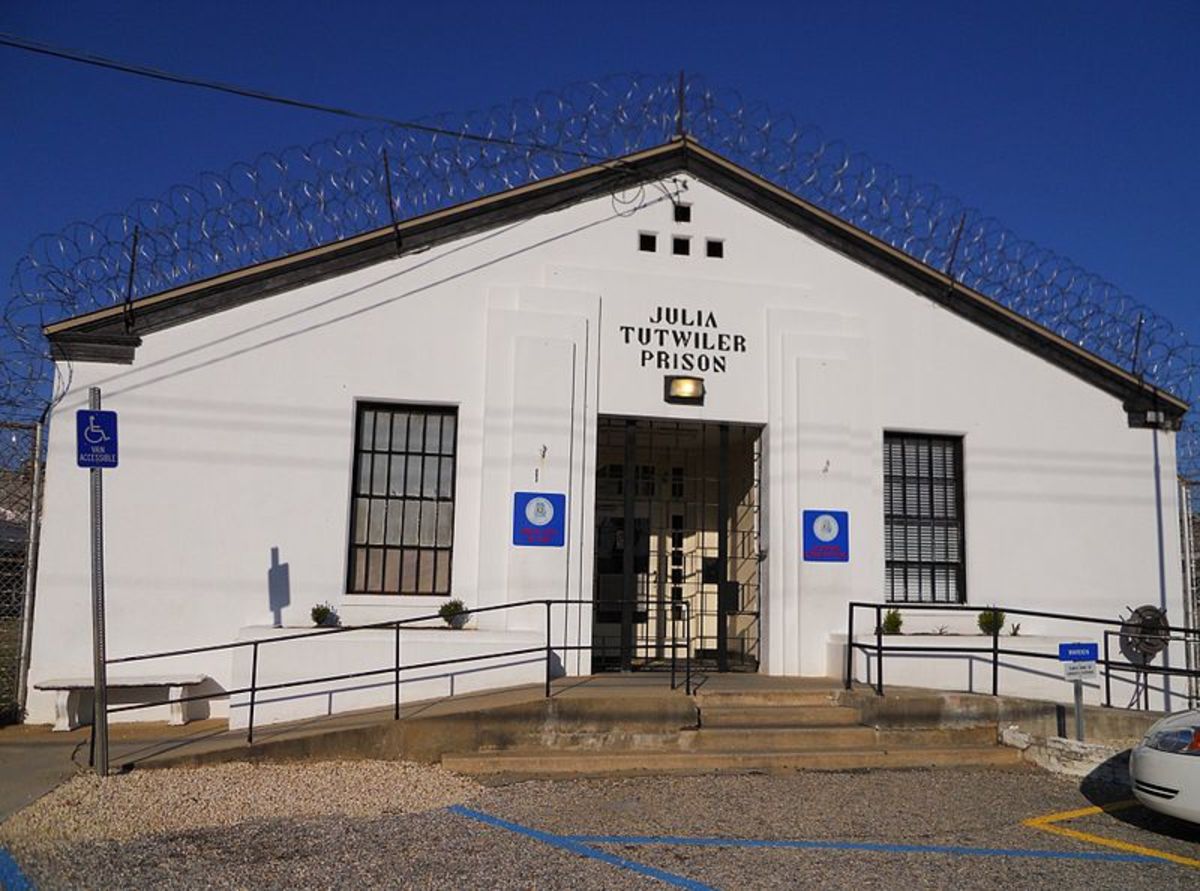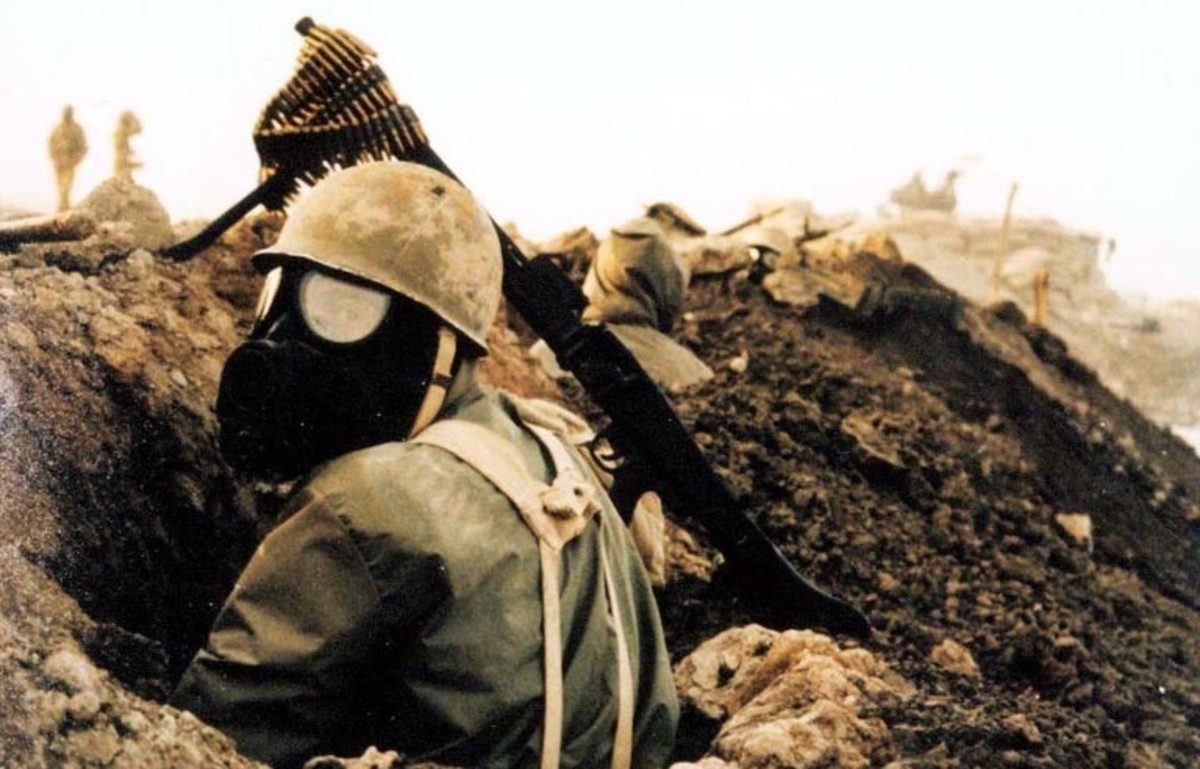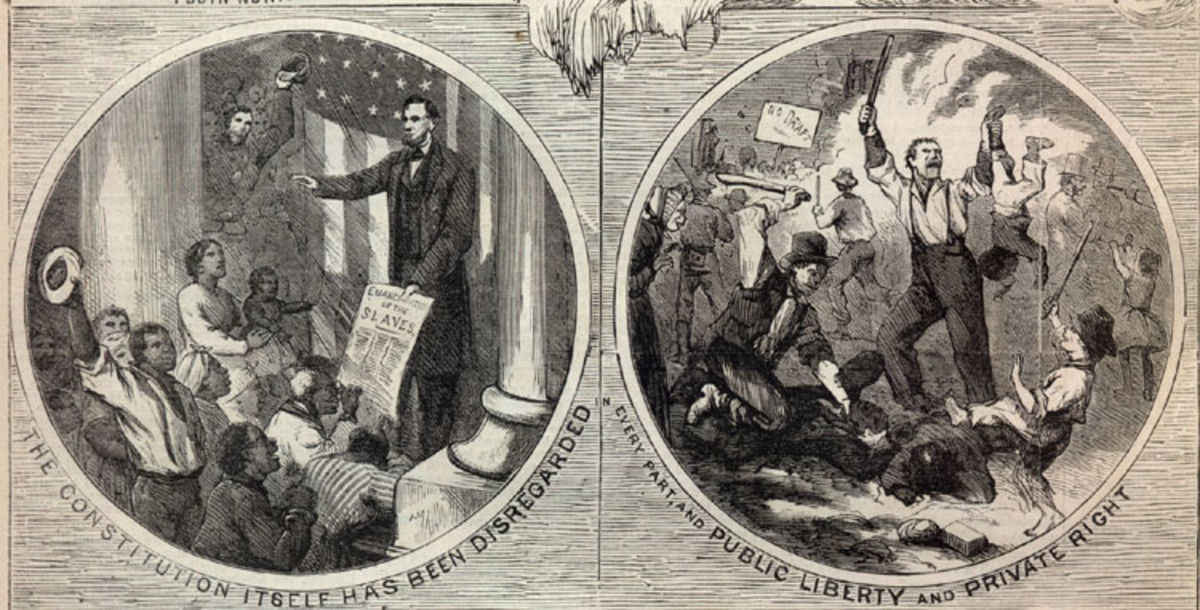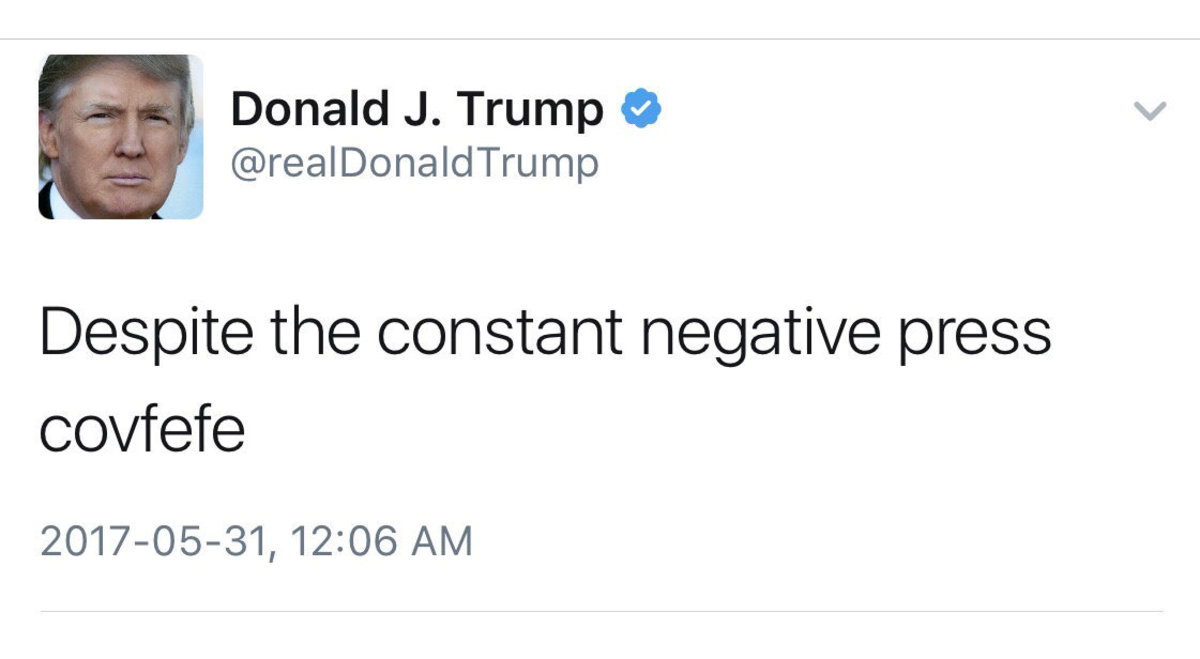Rolando Sarraff Trujillo - Betrayer Betrayed
To understand what the following narrative is about you must first read:
Rolando Sarraff Trujillo - Confessions of a Spy
Rolando Sarraff Trujillo - War of the Words
You can also watch the Netflix movie El Crazy Che
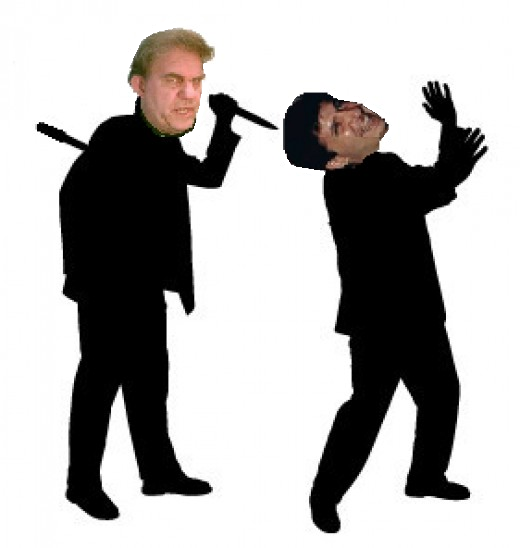
.
Season of high treason
When Pepe Cohen confessed to my wife and me that he had changed his mind about the Cuban Revolution and Fidel, he did so for the first time in January 1992 at the Riviera Hotel, in a room that had been reserved by the Interior Ministry. Captain Mario Dortas or Cortas, (a.k.a. Ramon) and Pepe had been following us on the Malecon Bulevard and surprised us from behind before we reached our destination. Pepe joked that they had seen us walking swiftly and laughed to themselves, “Look how fast the gringo is walking!” We had not seen Pepe for two years and it was a great moment for the three of us. They took us to the Riviera Hotel and Ramon opened all the doors with his privileged card. He took us to a nice room and the four of us sat down around – what else? – a bottle of rum to enjoy a happy welcoming chat. My wife and I narrated to them how we decided to visit Cuba at the last minute during our holidays in Colombia and on impulse were now there. Ten minutes into our talk, Captain Ramon excused himself to go to the bathroom. That’s when Pepe blurted out a whisper: “Billy, I’ve changed. I'll to see you tonight in your hotel.” The shock wave that ran through us is indescribable. Was this the same Pepe we had talked to two years earlier? Was this the fanatic communist, loved and trusted by his colleagues, despised by his own family, that defended the Revolution so tenaciously, saying that he would die in the Sierra Maestra fighting the Yankees if they ever invaded?
Years later I would discover through Pepe’s own lying AmWay mouth on a Miami program that the Riviera had been bugged from head to toe at least as early as 1988, perhaps even four years earlier. The job was contracted to the East German Secret Service (Stasi) by Interior Minister Ramiro Valdes who, according to researcher Jorge Luis Vazquez, also on the program, was “suspicious of everything and anyone”. And why wouldn’t the Cuban G2 have suspicions of me if I had opened my mouth and sneered at the revolutionaries in their faces in 1990 and had now come to the island unannounced? What had Officer Pepe, the fanatic communist who served as our guide on our first visit, written in his report to his superiors in 1990 if Fidel, who took all the trouble and expenses to thank us personally for helping the Revolution, decided not to meet us after all?
What makes it all the more treacherous is that Ramon moved us from the Saint John’s Hotel to the Riviera the next day and in the coming days we would meet with Pepe ‘in secret’ in our ‘private’ room and conspire with him in front of hidden cameras and recorders. Pepe put us at ease, saying that the Cuban Government would need to carry out a special operation to install gadgets if they wanted to record us. He said that there were no suspicions on us and that he would be notified of such an operation because we were in his care. In retrospect, the entire ruse was masterminded and supervised by the Interior Ministry. The CIA and the FBI would agree with my assessment during our extensive debriefing/interrogation/meetings at the end of March 1993.
What the Cuban Government never suspected was that Pepe was genuinely trying to defect. Pepe had indeed suffered a philosophical reversal after I pounded him so much during our four week stay in Cuba in 1990. The beatings had converted this born again revolutionary into an anti-revolutionary atheist, but, having awakened from hypnosis, he adroitly kept it to himself and later disclosed it only to close friends and family. Pepe was not acting in front of the cameras, or you could say that he acted so naturally because he had genuinely made a philosophical change. The Revolution rewarded him with its version of an Oscar for a job well done: it promoted him from lieutenant to captain. Then Pepe sailed away from Cuba without even saying goodbye to his wife.
But Pepe did not give me any intelligence information on this, our second trip, nor ask me to go to the CIA. And although we had met his wife Lazara in secret a couple of times, we had not yet met Roly. We told our Cuban handlers – Captain Dortas and Major Onelio Beovides (a.k.a. Rene) – that we would love to return in six months during our next vacation and they thought it was a good idea. In March, during our scheduled meeting in Mexico, we arranged to have joint vacations with our handler Luis Aguero. He was also planning to travel with his wife Luisa in mid year. In June the four of us met on the island and we even got to see our handler in Spain again – Feliciano Diaz Pacheco (a.k.a. Felix). We had not seen him since he gave us back our real passports in Madrid in January of 1990.
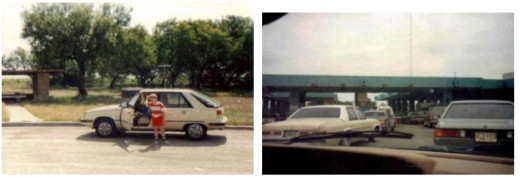
.
It was the best of times, it was the worst of times
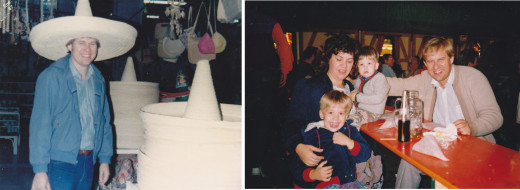
It was during our third trip in June that we met ‘in secret’ at Pepe’s apartment that he asked me to go to the CIA. Pepe invited us to his apartment in Vedado and introduced us to his high school buddy, Lieutenant Rolando Sarraff Trujillo (a.k.a. Roly), who also took us to his home in Playa one night. The three of us, together with our wives were now part of PR-2 (Partido Revolucionario 2), the name Pepe would give our fledgling cell. Pepe and Roly had prepared a list of names and some photographs, and my wife almost fainted at the thought of what we were involved in and doing. She looked at me and said, “You’re not going to the CIA, are you?” But one look at my face told her that I was crazier than Daffy Duck. We were in this for good and for real. FBI Special Agent James King would later state that there were operational reasons for bringing a guy like Roly into the group, so the addition of Roly only raised further suspicions.
I turned myself in to the CIA on Monday, July 13, 1992. I traveled to Langley and spilled my guts to a case agent code-named Katie. Six weeks later FBI Special Agents Jim King and Bob Baker of the Austin FBI scheduled a meeting with us at our home and we told the story of what had happened in the last 10 years of our lives with luxury of detail. On the second visit the agents asked our permission to record us and brought a large recorder for the job. I was one step ahead of them. I had been recording since I visited the CIA.
We met with the FBI agents for about three hours in each of three straight days. During that week, the agents asked me to prepare the material that I was supposed to deliver to Luis Aguero in September so that the CIA could determine whether I would travel to Mexico and meet with him as scheduled. I gave the technical material to the agents the following week. The agents were now complicit in the stealing of materials from AMD, but if the CIA decided not to carry out the counter-espionage operation that it was planning, the FBI now had material evidence against me in addition to voluntary confessions. As it turned out, the CIA decided that I would not travel to Mexico to meet up with Luis, something we had taken for granted.
The overture to the US agencies could not have started on the wrongest of feet, lasted so briefly, or ended up worse. After Bob Baker told me that I wouldn’t be traveling to Mexico, we figured that we would end up in jail and our kids in some foster home… unless we made a run for it. I got rid of seven large black bags of things I didn’t want falling into FBI hands, and between sobs we packed everything that we could carry, our kids included, and made a dash for Mexico, first, and then to Germany during the long Labor Day weekend. In Germany, a lawyer told us that the German Government would extradite us to the U.S. We had no choice but to return to the U.S. and start a new life with new identities, a private version of the Witness Protection Program. We returned to Mexico and my wife went south with the kids to Colombia to pick up our third son who was studying over there. We didn’t want him being held hostage by the U.S. or discovered by the Cubans. I crossed the border as I always did, illegally, using fake IDs I had made over the years. I went back and forth three times, first to pick up things I had stored in a hotel and then to pick up Nila and my sons who had flown from Colombia twice. The first time, the Mexican Government sent her back to Colombia, adding enormously to our frustrations, because she had no visa to enter Mexico. We sneaked into the U.S. while the FBI was still searching for us in Germany.
For seven months we were on the road, going from campground to campground while the posse looked for us in hotels and tracked our credit card usage. The kids loved it. No school. No work. An eternal vacation. We settled in Phoenix and started up a business cleaning homes. The elderly community in Sun City and Sun City West would be our natural market.
But my mother-in-law was dying and Nila had to make the trip to Colombia. Using a fake ID to get out of the U.S., she traveled to Bogota and then used her Colombian passport to get into Havana. We had to find out what had happened to Roly, Pepe and Lazara. SA King had told me in one of my calls to him while on the road that he was going to stir the beehive and that it had the potential to uncover the members of PR-2. I had no doubt what that meant. Fidel would execute them.
Nila took a taxi to Pepe’s apartment the first night and left a note with a sign, a code we had established indicating that we were in town. Pepe went to work and didn’t see the note lying at his feet when he crossed the threshold of his home. About an hour later, Nila knocked on the door and Lazara couldn’t believe her eyes. That night, Roly and Pepe joined them and they met ‘in secret’ in Pepe’s bathroom, talking in the dark for fear that their words could be seen. Lazara went back and forth bringing coffee.
Nila didn’t need to worry about how she would get back into the United States. We had originally planned to get her back through Mexico. Instead, she called me from Bogota telling me to turn myself in to the FBI again. She had incredible news – literally! Major Onelio Beovides (a.k.a. Rene), the second ranking officer of the M-VI, had fled the country and was in the hands of the CIA. And Pepe, Roly and Lazara had provided some more information that, together with Rene’s defection, would establish their bonafides with the American agencies.
I called Jim King and gave him my whereabouts. When Nila came back the FBI brought us to Austin and set us up in a hotel. They ‘debriefed’ us for a week, lie detector included, and the outcome was not even close to what I had imagined. Rather than us convincing them that Pepe, Roly and Lazara were for real, they convinced us that Pepe, Roly and Lazara were secretly working for Fidel Castro. We were stunned. We ran, ran, ran, and ended up in the same place! It was likely that the Cuban agents had no choice, that they were working under the gun, but by the 1st of April, our 17th Anniversary, there was no doubt in our minds that the Cuban Interior Ministry was behind this entire trap. Pepe had been fooling us since January of 1992. The probabilities of PR-2 being genuine were out of the charts.
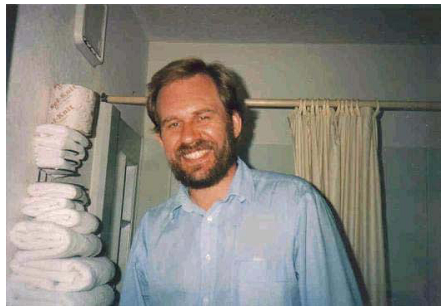
What were the problems? What did the FBI/CIA team argue?
Among them…
1. Pepe confessed to me in a room at the Riviera reserved by the Interior Ministry. He waited for Captain Dortas to leave us alone. Was this rehearsed, a planned move to allow Pepe to confess? There were no suspicions over us? …Even after Captain Dortas told Pepe that maybe they should report us to their superiors because we could have been sent by the CIA to charaterize Cuban agents?
2. The material PR-2 sent was ‘good’, but not earth-shattering, just what you would expect from a Cuban sting operation. Dangle a worm at the end of the line and let them bite. The FBI/CIA team concluded that Fidel’s people were luring them into a trap where U.S. agents would be caught in the act of attempting to extract Cuban intelligence officers from the island. It had already happened once before. They didn’t want to be on the Cuban nightly news again.
3. Fidel knows every leaf that moves on the island. He’s got eyes everywhere. But here we came and went with Pepe and Roly to their homes and their parents’ homes ‘in secret’ and no one ever found out about it?
4. I called Pepe from Germany when I escaped from the FBI. Roly and him were supposed to run with their families and their guns to the nearest embassy and ask for asylum. They didn’t. They told Nila that, fortunately, the listening system was down that week. How did they know? Why did they wait to determine that when their lives were supposedly at stake?
5.Why didn't Lazara provide a cryptocard to establish her fonafides with the CIA if she worked at the Crypto Analysis / Cryptography Directories. That information would have been more useful than all the names that Pepe and Roly provided.
6. Maria Luisa Hernandez, Roly’s mother-in-law comes to the U.S. and sends me a package. She asks for an extension to stay in the U.S. another three months, just enough time to allow me to send word back to Roly and Pepe through her that I made contact with the CIA. How did she know that I was really going to do it? Later, Maria Victoria de Bernard, a friend of Pepe’s comes out. She’s a 32 year old artist that tells me that she is surprised that she got an exit visa. Was Fidel behind all this?
The list went on and on. There were simply too many coincidences and improbabilities. The agencies did not bite. They decided to wait. Three couriers later, the Cuban members of PR-2 had nothing to show for their efforts. They had not established their bonafides.
How Roly got caught
While the Cuban agents were safe in their little island, suffering no more than the rigors of daily life to which they were accustomed, my life had been turned upside down and torn apart. In order to get a measure of stability back into it I had to get a job, but who would hire an ex tech spy with a record as long as mine? Advanced Micro Devices was looking everywhere for me and Pete Costner, AMD’s Security Chief, kept badgering Jim King and John Grant to tell him where I was. What kind of a chance did I have of working in the semiconductor industry ever again with such a background and such a bloodhound hounding me? Jim King came up with a solution: I would use him and Special Agent John Grant for references. Whoever called, they would vouch for me. I finally landed a good job at Intel Corporation, AMD’s competitor, in Chandler, Arizona and Jim King would comment one day that it was fortunate that these companies don’t do a thorough background check. “There’s not a lot that could be showing up.”
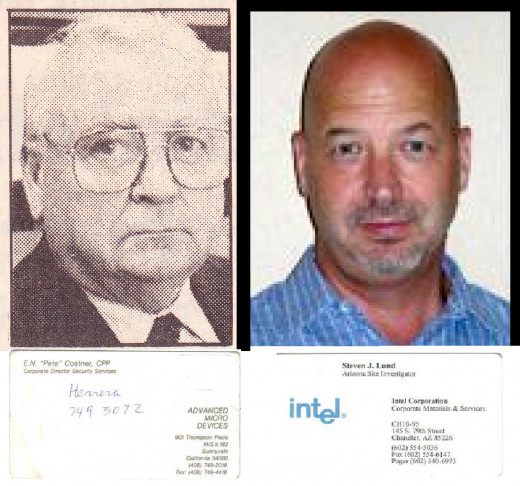
However, Pete Costner didn’t give up. Angry at what I had done he circulated my name at the Semiconductor Industry Association. John Grant told me one day that, “They put a wanted poster for you over there.” I asked him if the words underneath my face read ‘Dead or Alive’ and we both laughed.
Costner’s gamble paid off. One day I got a call from Intel Security Chief Steve Lund, an ex-FBI agent. He wanted me to cooperate in an ‘internal’ investigation as required by my contract with Intel. Apparently, Lund wanted to collect evidence for an ‘external investigation’ – AMD – an ironic cooperation between these two enemies. John Grant couldn’t do anything to protect me from these vultures. It was a matter of time before I would be fired. I either cooperated with Intel and went to jail or I didn’t cooperate and would have to look for a new job, certainly not one in the semiconductor industry. King and Grant were probably not going to go out of their way to recommend me for yet another job when these two giant companies were already in the process of tying the rope around the branch.
I decided to take a little bit of insurance. Intel had installed a terminal in my home so that I could support the fabrication area 7/24. I stealthily obtained security clearance from my boss Rodney Baba to log into the Albuquerque database where they manufactured the state-of-the-art Pentium. Knowing that security was sensititve to downloads, I scrolled the entire spec system over two days, some 12 hours each – not a trivial job – and filmed the screen. Then we packed our bags with my wife and traveled to Athens, Greece.
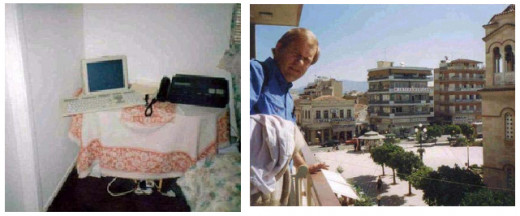
However, Steve Lund was also working overtime on the case. He hired a detective to follow me around and this man discovered that I kept a Surgard storage box under the name Bill Green where I put some stuff before going to Greece. I had placed several of the tapes that I had made of FBI and CIA agents over the past two years as well as a copy of Intel’s Pentium specs. When we returned from Greece, all hell broke loose. I received a call from two detectives, Slade Chestnut and Al Hiser of the Phoenix Police Department. They wanted to talk to me about the robbery that had occurred at the Surgard storage. That was funny? They rob my storage and the agents want to talk to me? It’s like someone robbing the bank and they arrest the depositors who were standing in line.
Fortunately, Steve Lund called before I went to the police station and put me at ease. I was going to go to jail. He told me that he had in his hands a bag that some dumpster divers sold to him for $500 containing tapes that included Intel proprietary material.
Huh? Break in? Dumpster divers? The police nab two robbers, but they let them go? No charges filed? And the police want to talk to me? If that wasn’t the fishiest story you ever heard!
Lund also told me that he had given some tapes I had made of agents to the FBI. John Grant would not be very pleased when he found out that I had been filming and recording the agents since who knows when.
I went to work on Tuesday, May 31, 1994, with the conviction that it was the last day of my life. Steve Lund didn’t upset those expectations too much. Not 15 minutes had gone by when Lund and six Intel soldiers came into the room, scaring the hell out of my startled co-workers, and asked me for my badge. The platoon escorted me to the doors, perhaps fearful that I might swipe some more technology on the way out, and off I went to another adventure.
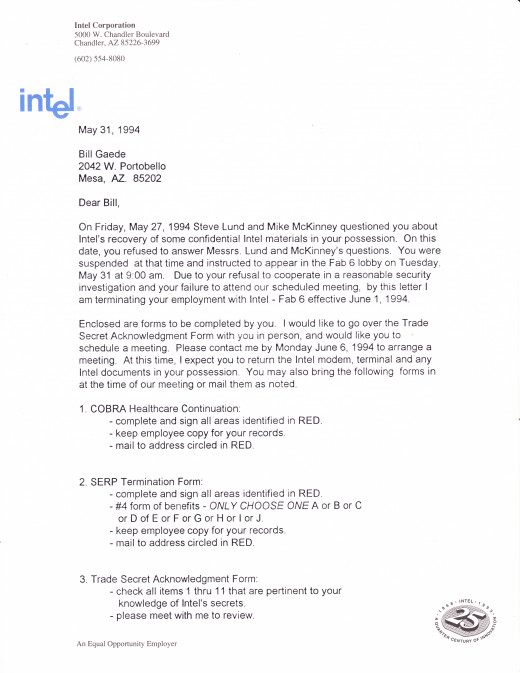
My troubles weren’t over. My wife called me while I was on the road home and told me that Grant was rushing to our home. Fortunately, I beat him to the draw. I got home, took my passport, some critical tapes I had, and some gold coins, put them in a box, and tied a rope around it. Then I slowly lowered the box over the fence into my neighbors back yard. If Grant came with a search warrant, he would be slightly disappointed.
Grant and another agent, who introduced himself as Jack Smith, didn’t come in nicely. They barged in and, I have to believe that Smith was sent to make sure Grant didn’t kill me. Grant was furious. “Why did you film us? Why did you record us?”
I sat there like a little boy pouting and waiting for the fury to die down, but it didn’t until Grant took his briefcase and slammed it as hard as he could against my wobbly plastic table. He had missed my leg by an inch. “You know what you are, Billy? You are God damned paranoid!”
I waited for a strategic 3 seconds before replying under my breath. “When you’re working with the FBI and the CIA, if you’re not paranoid, you’re dead!”
That was the magic spell. The two agents released their tension and laughed out loud for over a minute. Before leaving, Grant walked to my oven from which I had secretly filmed him many times and waved bye-bye to an inexistent camera.
The OvenCam
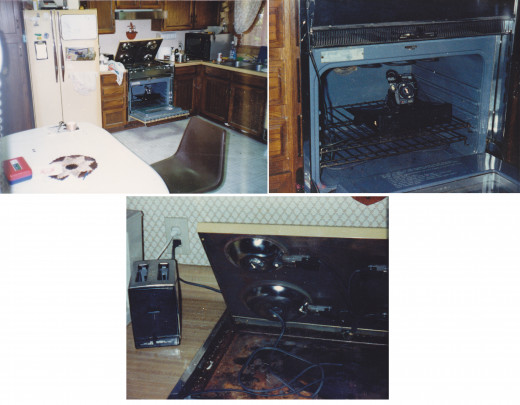
.
FBI Special Agent John Grant caught paying
I packed up my belongings, said bye bye to my faithful Sancho Panza, and Don Quixote was one more time a pariah, roaming the world, seeking windmills to stab with his lance. I traveled first to Buenos Aires to get some things in order and then to Colombia where I stayed for a couple of months making copies of my tapes and organizing the volumes of information that I had brought out of the U.S. Sensing that I was being monitored and having no further business in Bogota, I went south again to Buenos Aires where I felt more at home.
I arrived on September 16, 1994, and part of my goal was to get even with the Cuban agents for ruining my life. The first week I sent three packages containing letters and tapes to three Cuban embassies. The packages were all the same, and the main letter was addressed to Colonel Agustin Broche (a.k.a. Marcos) the head of the M-VI and Pepe’s superior. I told Marcos that Pepe was the one who was supplying information to the CIA through me. The tapes and the letters that I enclosed also made it clear that Roly and Lazara were in on it as well. What I didn’t know was that Pepe had managed to leave the island on August 18, 1994, about a month earlier. I had missed the lucky dog by an inch!
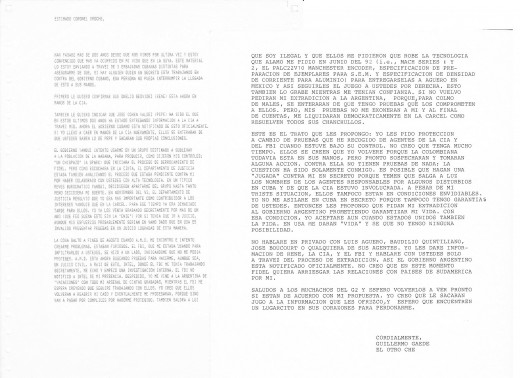
But I cannot imagine that Marcos took no action regarding the other two after what was in the package. And I have to believe that Baudilio Quintiliano, whom I knew personally and who still worked at the Cuban Embassy in Buenos Aires, received the package I sent him. The way I figured there were three possibilities:
- If the Cuban Government was behind PR-2, then Fidel knew all about Roly and Lazara because he sent them purposely to channel information to the CIA through me. Fidel would have laughed at my letter and take no action.
- If, instead, the Cuban Government did not know about PR-2, Fidel would have arrested Roly and Lazara and executed them both.
- If Fidel knew all about PR-2, he would take no action. But then Pepe escapes and now there had to be suspicions that maybe Roly and Lazara also had secret plans.
I personally think that this last one is what actually occurred because Lazara was briefly detained for questioning when Pepe escaped. However, since the M-VI knew about Lazara’a participation in PR-2, everything with her was in order. She had no idea that Pepe was about to escape – maybe he feared marriage more than he feared Fidel. That reply would have satisfied the interrogators. Maria Victoria de Bernard had told me that Lazara had quit her job at the Interior Ministry in March of 1994 in order to take care of her three kids. And Lazara was not actively planning to leave the island. So she became irrelevant to the Interior Ministry in every sense. They merely kept an eye on her now and then. Lazara was certainly watched after Pepe defected like the family of Onelio Beovides (Rene) was watched after he allegedly defected.
Roly, on the other hand, was not detained. Assuming the Interior Ministry knew about him belonging to PR-2, there was nothing in my letter that the decision makers didn’t know. However, Pepe’s escape certainly had to raise a flag. Maybe the three participants that the Interior Ministry had selected to bamboozle me were not acting in front of the cameras. Maybe they really intended to elope.
What was interesting is that Roly was sent to work overseas in Russia. Keep in mind that Roly was NOT a cryptographer as President Obama stated on national TV. .Roly knew absolutely nothing about cryptography. Whatever he knows about cryptography after the U.S. Government releases him are the rudimentaries of Cryptography that the Agency taught him these days in preparation for his press conferences. Roly is not being debriefed nor being checked medically any more than Alan Gross is. Roly is undergoing a steep learning curve as I write. Roly was a gadget man. He planted bugs and interviewed people to characterize them and determine who was loyal to the Revolution. Then he would write reports to his superiors. Roly worked in the M-XV which did wiretapping and surveillance of agents. The M-XV did NOT do Cryptography (M-VIII) or Cryptographic Analysis (M-XI). The Cuban system at that time and certainly today, just like the U.S. system, is strictly compartimentalized. One section knows nothing about what’s going on in its sister department. Therefore, Roly not only did NOT work in Cryptography, he had no access to codes or cryptographic information, much less to encryptions used to communicate with moles and spies in the field. This information is jealously guarded and controlled very carefully.
But the information that I sent to the Interior Ministry certainly had to follow him to Moscow. Here was a guy who was supposed to surveil people in the embassy who was in turn being surveilled by others, spies who take advantage of information they have on other spies. The counter-espionage agents were onto him. The betrayer had been betrayed.
Pepe denies it today, but Roly was in contact with him. The CIA had established a wormhole to the invisible parallel universe of Cuban intelligence through these two close friends. That was the value of Pepe to the CIA. That’s why he lived the first few years in the vicinity of Langley. They did so through third parties which both knew and trusted.
Roly was recalled back to Havana under a pretext and shortly after landing at Marti he was arrested and put away for good. Pepe lost his contact and was of no further use to the CIA. He became – what else? – a successful AmWay salesman. And Lazara ended up in her own prison, waiting now for 20 years for the Cuban Government to grant her an exit visa. Although all three of these individuals are excellent human beings and I love them for who they were, I will never forgive their vile betrayal despite that I am sensitive to the fact that they were under the gun to act against me in Cuba. We went to Cuba with my wife to help them and their children get out and they stabbed us in the back. They had several occasions to whisper in certain areas we visited that the whole thing was a setup.
Roly in the can
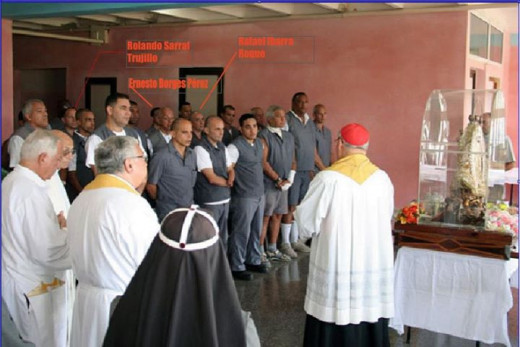
And betrayers betray amongst themselves. Not only did Pepe betray me, but he betrayed Roly and Lazara as well. In the letter Pepe wrote in March of 1993, we read some famous last words:
“I will try to travel if only for business. Purpose to see you. When we leave with [our] families we won’t return [to] Cuba. Only to struggle for change. He who leaves first of us two must wait for the other. We are all determined to leave before for example in [a] container, in [a] diplomatic bag if situation requires it.”
Well… Pepe didn’t wait for Lazara or for Roly. He made plans on his own when he realized that the CIA wasn’t going to come for him. Pepe left Lazara and Roly behind holding the bag. Together with my denunciation, it cost Roly 20 years of his life. I did a few less. I did only 3.
.
Upcoming article:
Rolando Sarraff Trujillo - How Intel lost its Pents
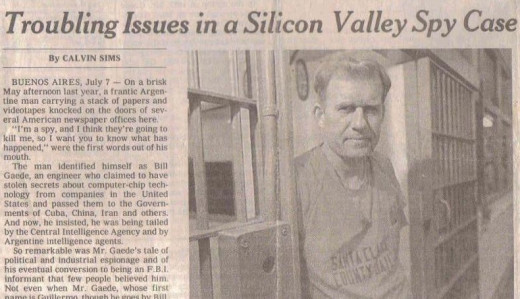
.
.

